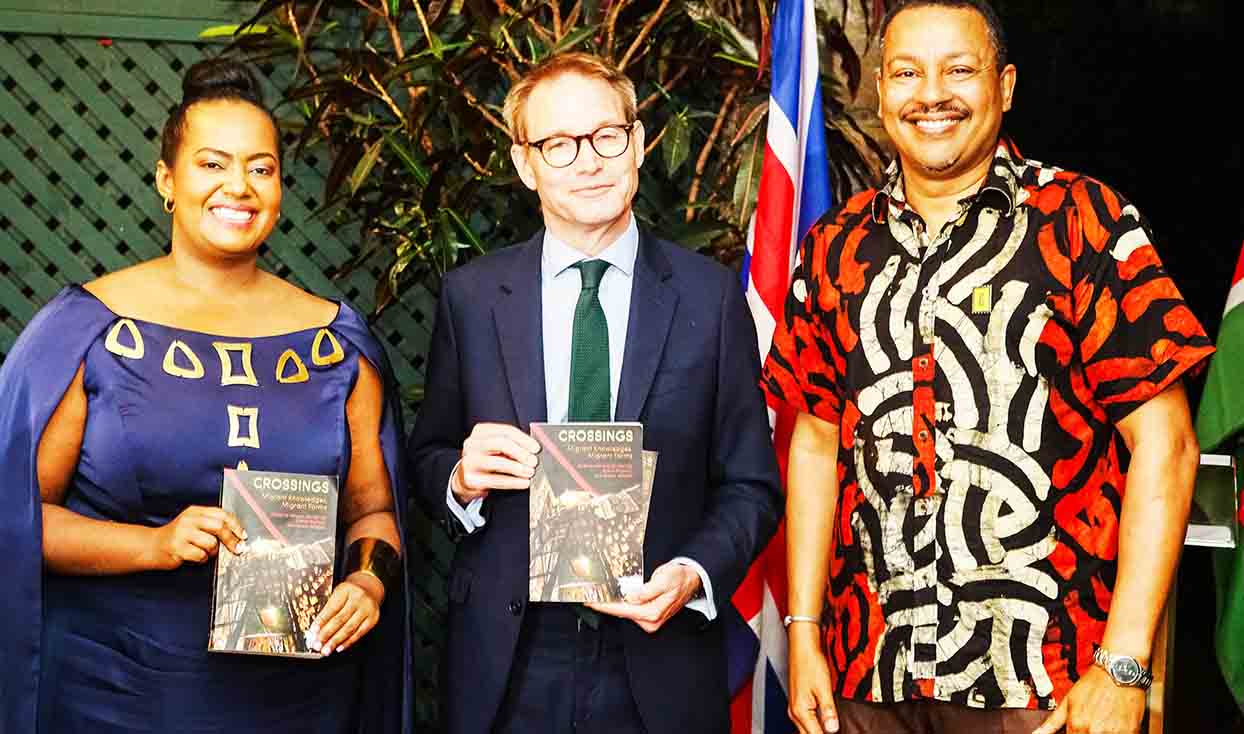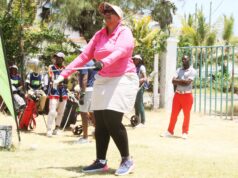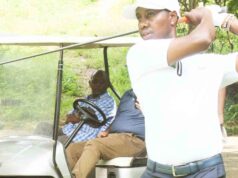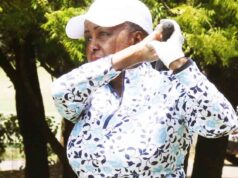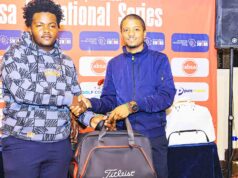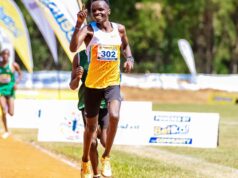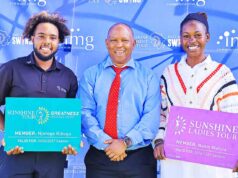-Crossings: Migrant Knowledge’s, Migrant Forms, edited by Natalya Din-Kariuki, Subha Mukherji, and Rowan Williams and forthcoming from punctum books, brings together activists, artists, scholars, and migrants with diverse histories to explore what the experience of migration does with, and to, knowledge, and how its own ways of knowing find expressive form.

MAARUFU MOHAMED-GOLFNEWSLINKS.
The British High Commissioner to Kenya, Neil Wigan, hosted the launch of Crossings-Migrant Knowledge’s, Migrant Forms at his residence in Nairobi in an evening that brought together humanitarians, artists, diplomats, and advocates for a powerful conversation on movement, belonging, and solidarity across borders.
The book was conceived by Subha Mukherji, Professor of Early Modern Literature and Culture at the University of Cambridge. Edited by Mukherji, Natalya Din-Kariuki (Associate Professor at the University of Warwick) and Rowan Williams (former Archbishop of Canterbury), Crossings brings together activists, artists, scholars and migrants with diverse histories to explore what the experience of migration does with and to knowledge and how its own ways of knowing find expressive form.
The launch featured a wide-ranging conversation between Din-Kariuki and Irungu Houghton, Executive Director of Amnesty International Kenya, on the uses of history, the relationship between migration and art and the importance of thinking expansively about the different categories of migrants and migration.
The High Commissioner congratulated the editors on the completion of the book and pointed out that “Every human being is a migrant from East Africa originally” and explained that for both the UK and Kenya, “migration is at the heart of our history.”
Guests also heard a special message from Rowan Williams on how Crossings “opens up new spaces for thinking about a world where displacement and diversity are so much a part of both our hopes and our anxieties”.
Event Highlights.
Hosted by British High Commissioner Neil Wigan at his Nairobi residence Conversation between co-editor Natalya Din-Kariuki and Irungu Houghton Response from writer Joyce Nyairo Message from co-editor Rowan Williams, former Archbishop of Canterbury Reflections by co-editor Subha Mukherji (via message).
About the Book-Crossings.
Migrant Knowledge’s, Migrant Forms brings together activists, artists, scholars, and migrants with diverse histories to explore what the experience of migration does with, and to, knowledge, and how its own ways of knowing find expressive form.
As the volume’s authors think about physical and imaginative crossings, and the traversals and transactions of knowledge they entail, the book itself crosses and complicates disciplinary and formal boundaries and the barriers between critical and creative intervention. Crucially, it brings together voices and forms emerging out of the experience of dislocation with responses to the encounters it generates.
The volume’s discussions begin in the early modern world and move freely across periods to dwell on the urgent experience of migrancy in our own times while also responding to an urgent need to connect the local with the global experience of migrant knowledge and migrant aesthetics.
Crossings stakes the claim that creative art, backed by humanities-based thinking can meet the imaginative and ethical demands that the unknowable reality of mass displacement places on us in a way that governments, institutions, and public discourse have calamitously failed to do.
But aesthetic practice itself needs to be re-positioned if it is to rise to these political and human challenges, negotiating the points of friction between its own predilections and the matter of migration.
Crossings is forthcoming from the publisher punctum books.
Natalya Din-Kariuki is an Associate Professor at the University of Warwick and works on the literary and intellectual history of the sixteenth and seventeenth centuries with a particular focus on travel writing, transnational and transcultural encounters, and rhetoric and poetics.
Subha Mukherji is a Professor at the University of Cambridge and her research interests and publications range across Renaissance English literature, early modern law and drama, form and faith, literary epistemologies, migration, and contemporary Indian art.
Rowan Williams was Archbishop of Canterbury from 2002 to 2012, and from 2012 to 2020, Master of Magdalene College, Cambridge. He has published widely on religion, literature and politics.
Rowan Williams said, “Human thinking, human imagining, is a ‘migrant’ business. We discover and change by finding ourselves not at home in our environment. This may be as a result of violent, forced change; it may be a choice; it may be an individual discovery of the need to speak out against an oppressive, alienating context. It may be a mixture of all these. It may produce a bewildering fusion of cultural heritage; it may push us back to rethink or rework the legacies we have inherited. But the point
is that displacement, encountering strangers, learning new languages, adjusting to new neighbors, is not an exception in the history of human culture but the norm.”
Subha Mukherji said, “When we encounter the strange, we become strangers: it can make us confront our own vulnerabilities, and open up new possibilities of solidarity We tune into the paradoxes of exile in our collaborative book, Crossings and commit to being true to the texture of transitory lives.”
Natalya Din-Kariuki said, “Knowledge is a ‘migrant form’: it often begins in one place and ends up in another, crossing geographical, historical, cultural, and textual borders along the way. It is a pleasure to be reflecting on these questions in my home city of Nairobi, a place which has itself been fundamentally shaped by migrants and all kinds of crossings.”
ENDS.
KINDLY ADVERTISE WITH US.
FOR YOUR GOLF/SPORTS/BUSINESS/ENVIRONMENT/HEALTH/OPINIONS/SPONSORED CONTENTS OR BUSINESS PROMO,
CONTACT US.
mmaarufu@gmail.com.
golfnewslinks@gmail.com.
Phone/What’s up…+254726614604.
+254722415598.





